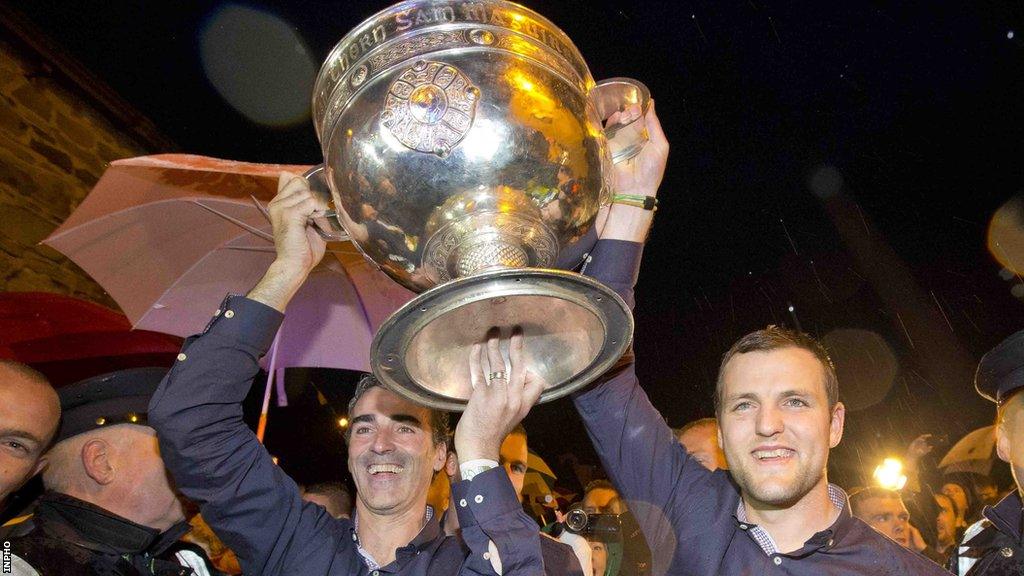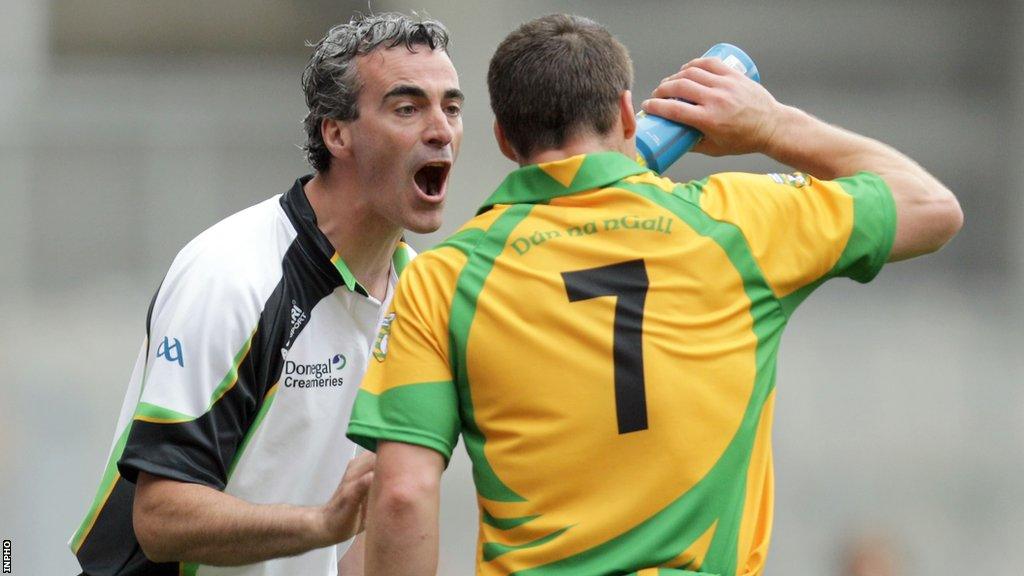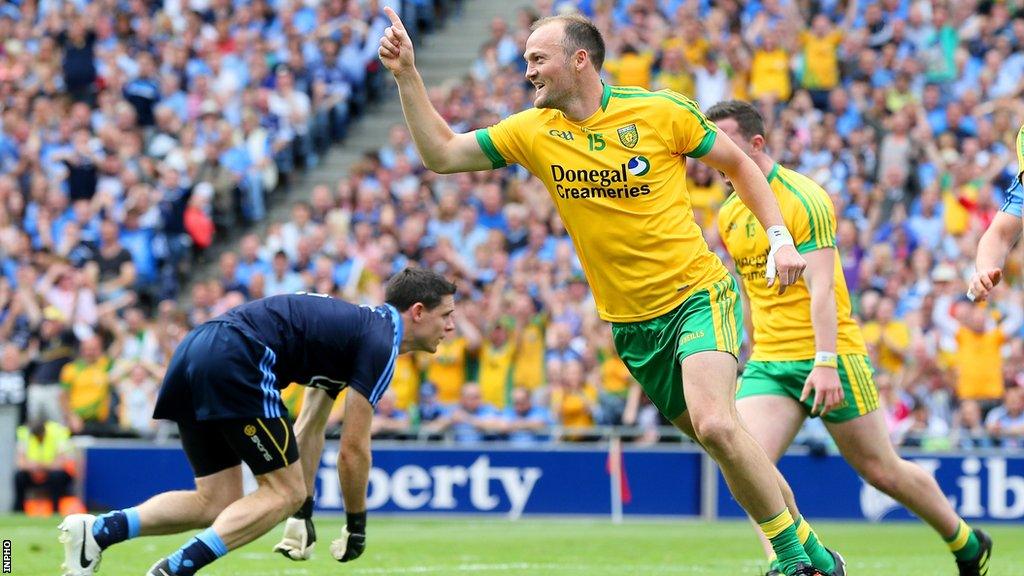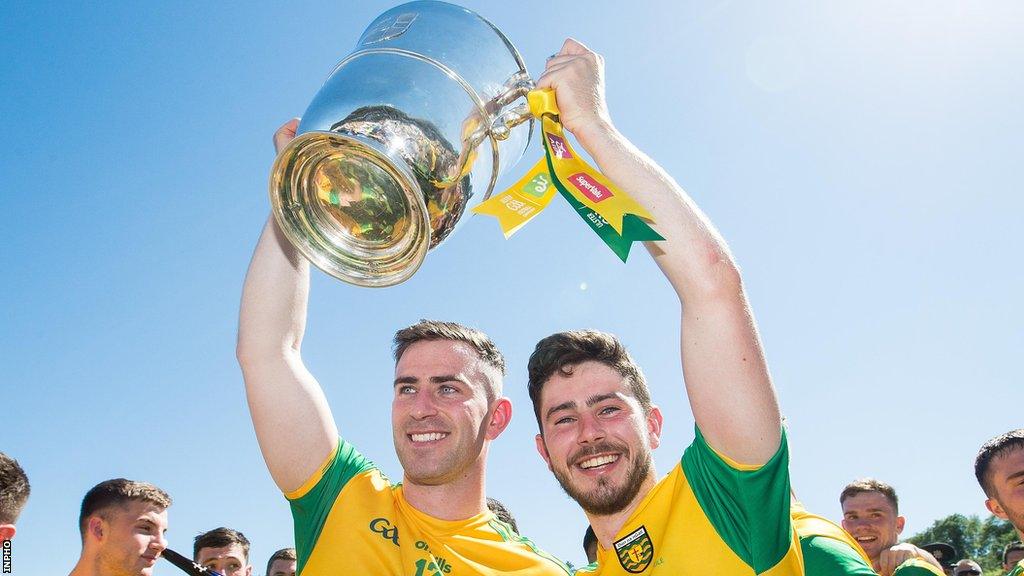Jim McGuinness: Can history repeat itself in Glenties man's second Donegal coming?
- Published

Michael Murphy was Jim McGuinness' All-Ireland winning captain in 2012 but retired from inter-county duty last year
Donegal football fans will hope Jim McGuinness' second coming sees history repeating itself by him arriving with the county at a low ebb before dramatically restoring their fortunes.
The Glenties man's appointment in 2010 came less than two months after an embarrassing All-Ireland qualifier defeat by Armagh.
McGuinness took over a Donegal side that seemed to have tamely surrendered during John Joe Doherty's final match in charge in Crossmaglen and, by the body language of the players, didn't appear unduly bothered either as they succumbed 2-14 to 0-11.
The transformation was almost instant as Donegal were promoted back to Division One by the following April.
Three months later, McGuinness' side won the county's first Ulster title in 19 years as they beat Derry 1-11 to 0-8 in the provincial decider after Dermot Molloy's injury-time goal had earned a dramatic 2-6 to 0-9 semi-final win over defending champions Tyrone.
But while McGuinness was being hailed as the football messiah in the hills of Donegal, not everyone was buying into his guru-like status.
McGuinness system not to everyone's taste
His side's rigid adoption of a blanket defence system in year one was not pleasant to the eyes of many traditionalists or some who regarded themselves as football purists.
After edging their way past Kildare 1-12 to 0-14 in the All-Ireland quarter-finals amid a thrilling finish as Kevin Cassidy hit the winning score, then RTE pundit Joe Brolly accused McGuinness of "stinking the place out" following the semi-final after his tactical attempts to curb an attack-minded Dublin who eventually edged a turgid contest 0-8 to 0-6.
McGuinness described the negative coverage of his team's All-Ireland semi-final performance as "disrespectful", claiming pundits "want us to play football that, in my view, is fantasy football".
The Donegal manager's take at that stage was that his team had been in year one of a project, which involved making them defensively sound and difficult to beat.
"Maybe next year, when we have a year under our belt, we might carry more of a threat and maybe we can ask more questions offensively," said McGuinness of his more expansive plans for 2012.
By the following September, McGuinness was in in a strong position to argue that he had been vindicated as Michael Murphy's immediate goal and a further first-half major from Colm McFadden earned a deserved 2-11 to 0-13 All-Ireland Final triumph over Mayo.
Donegal's scoring average up was from 13.66 points a game in 2011 to 17.7 in 2012 and the team, while still founded on defence, had certainly been a better watch in year two, with skipper Murphy leading from the front as he kicked vital scores in addition to giving midfield a dig out when needed.

Kevin Cassidy helped McGuinness' side win the 2011 Ulster title but was jettisoned from the squad later that year after details he divulged Donegal's 2011 campaign in a book
McGuinness' achievement in turning a team that had been frankly something of a shambles in 2010 to All-Ireland champions in two years was regarded by many as testament to his tactical genius, although some pundits remained ambivalent and in some cases, openly hostile to Donegal's successful method.
Donegal's All-Ireland triumph had come minus former captain Kevin Cassidy who had been ruthlessly jettisoned by McGuinness after revealing seemingly too much about the squad's 2011 campaign in a book authored by highly regarded GAA writer Declan Bogue.
But Cassidy seemed an afterthought to the people of Donegal as the county joyously celebrated a second Sam Maguire Cup triumph exactly 20 years after McGuinness had been an unused substitute in the All-Ireland Final win over Dublin.
Whether the outpouring of emotion that seemed to go on for weeks in Donegal was a contributory factor to their comparatively disappointing defence of their provincial and All-Ireland titles in 2013 is open to debate.
A summer which had begun impressively by defeating Mickey Harte's Tyrone for the third successive year in the Ulster Championship eventually petered out, as a comprehensive 0-13 to 0-7 provincial final defeat by Monaghan was soon followed by Mayo's thumping 4-17 to 1-10 All-Ireland quarter-final win.
The fallout from that Croke Park defeat saw Rory Gallagher and Maxi Curran departing from McGuinness' backroom team, amid claim and counter-claim about whether they had left of their volition or at the instigation of the manager.

Donegal stunned Dublin in the 2014 All-Ireland semi-finals but then were surprised themselves by Kerry in the decider which proved the final match of Jim McGuinness's first reign
By the following summer, Donegal were celebrating another Ulster title after reversing the 2013 final defeat by the Farney men as they earned a 0-15 to 1-9 final win at St Tiernach's Park.
After stumbling to a 1-12 to 1-11 All-Ireland quarter-final win over Armagh, few gave Donegal much chance of beating defending champions Dublin in the semi-finals.
However, the 81,500 crowd at Croke Park witnessed arguably McGuinness' finest hour as his side fought back from 0-9 to 0-4 down after 25 minutes to win 3-14 to 0-17 following a stunning display of counter-attacking football, with Ryan McHugh notching two of their goal.
After that performance, even the Kingdom were not expected to deny the Tir Conaill men a second All-Ireland title in three years but Donegal produced a strangely inhibited display to lose 2-9 to 0-12 with Kieran Donaghy's 52nd-minute goal, after intercepting a misdirected Paul Durcan kickout, the key moment of the game.
Within a few weeks, McGuinness' first stint in charge of Donegal was over with him having already begun his foray into soccer coaching two years earlier following his appointment as a performance consultant with Celtic.
By the autumn of 2014, McGuinness was working with Celtic's first-team squad before becoming assistant boss to former Bayer Leverkusen manager Roger Schmidt at Chinese Super League club Beijing Guoan in July 2017.
Beijing and Charlotte stints prove brief
McGuinness stepped down form the Beijing role six months later citing "personal family reasons" but was back on his travels again after being appointed manager of second-tier US football club Charlotte Independence in December 2018.
However, once more that stint abroad proved a brief affair as he was sacked within six months after his team's run of only one win in 14 games.
Since returning to Ireland, he has had a soccer coaching role with Derry City's under-19 team in addition to dipping back into the GAA by taking occasional training sessions with inter-county teams along with regular media punditry work.
Inevitably, McGuinness' second coming to his native county has inevitably led to excitement about just what he might be able to achieve with this group of Donegal players despite their relative struggles over the past three years.
After winning successive Ulster titles in 2018 and 2019 under Declan Bonner, Donegal looked the side potentially best equipped to halt a Dublin six in a row as Covid-19 gripped the world in 2020 but they were stunned by Cavan in the autumn provincial final and in truth have never looked the same side since.
Barring an unexpected change of heart by the Glenswilly man, McGuinness will also inherit a Donegal squad without the services of his 2012 talisman Murphy following his retirement last year.

McGuinness will surely hope that Ryan McHugh returns to the Donegal squad in 2024 alongside his Kilcar club-mate Patrick McBrearty
But while Murphy is not there, you can make a convincing argument that Donegal are in no worse shape - and indeed may be better off - than they were in late 2010.
Then as is the case now, Donegal were in Division Two, with John Joe Doherty's team having failed to earn promotion that year and, just as this summer, having lost to Down in the Ulster SFC before the Crossmaglen embarrassment.
With Murphy gone, Kilcar duo Patrick McBrearty and Ryan McHugh are the only members of the 2014 squad still around - albeit the latter opted out of the squad this year during Paddy Carr's brief stint in charge and Aidan O'Rourke's subsequent time as interim manager.
McGuinness should be able to call on a host of other talented performers in the shapes of Eoghan Ban Gallagher, Oisin Gallen, Michael Langan, Ciaran Thompson, Caolan McColgan and Peadar Mogan.
The new manager will also hope Niall O'Donnell and Shane O'Donnell will join Ryan McHugh in returning to the squad after opting out this year so despite Donegal's Annus Horribilis in 2023, McGuinness may feel he has plenty of good material to work with.
But whatever about the personnel, the most interesting aspect of McGuinness' second coming will be what wonderous tactical innovations the first Uefa pro licence holder to manage a GAA team comes up to get the pundits ruminating on once more.